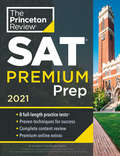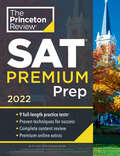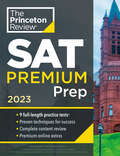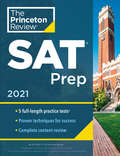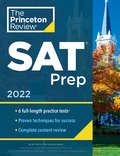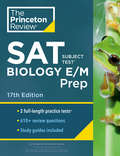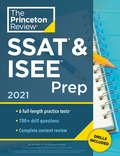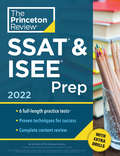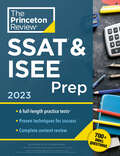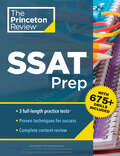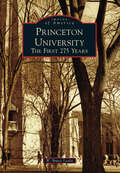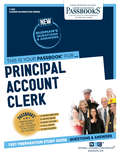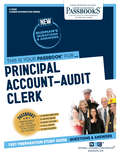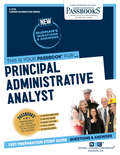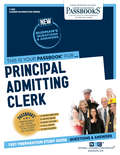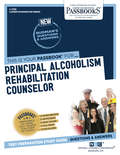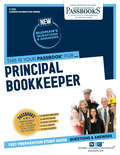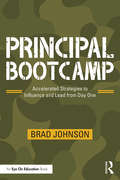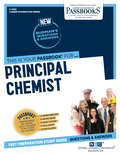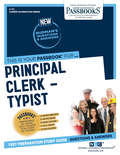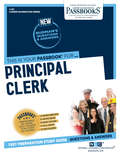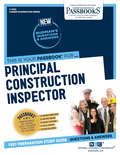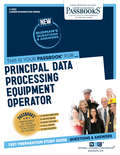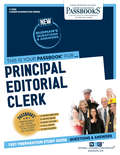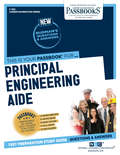- Table View
- List View
Princeton Review SAT Premium Prep, 2021: 8 Practice Tests + Review & Techniques + Online Tools (College Test Preparation)
by The Princeton ReviewTHE ALL-IN-ONE SOLUTION FOR YOUR HIGHEST POSSIBLE SCORE—including 8 full-length practice tests for realistic prep, content reviews for all test sections, techniques for scoring success, and access to premium online extras.Everything You Need to Know to Help Achieve a High Score.· Comprehensive subject review for every section of the exam· Valuable practice with complex reading comprehension passages and higher-level math problems· Hands-on experience with all question types (multi-step problems, passage-based grammar questions, and more)Practice Your Way to Perfection.· 8 full-length practice tests (4 in the book, 4 online) with detailed answer explanations· Drills for each test section—Reading, Writing and Language, and Math—plus writing exercises to help prepare for the essay· In-depth online score reports for all practice tests to help analyze and track your progressTechniques That Actually Work.· Powerful tactics to help you avoid traps and beat the SAT· Pacing tips to help you maximize your time· Detailed examples of how to employ each strategy to your advantageIncludes Access to Premium Online Exclusives:· Videos to teach you SAT test-taking strategies and commonly-tested topics· Access to college and university rankings, college admissions advice, and financial aid tips· Multi-week study guides· Special &“SAT Insider&” section packed with helpful info on picking your perfect school and writing essays that stand out
Princeton Review SAT Premium Prep, 2022: 9 Practice Tests + Review & Techniques + Online Tools (College Test Preparation)
by The Princeton ReviewTHE ALL-IN-ONE SOLUTION FOR YOUR HIGHEST POSSIBLE SCORE—including 9 full-length practice tests (the MOST in an all-inclusive guidebook on the market!) for realistic prep, content reviews for all test sections, techniques for scoring success, and access to premium online extras.Everything You Need to Know to Help Achieve a High Score.· Comprehensive subject review for every section of the exam· Valuable practice with complex reading comprehension passages and higher-level math problems· Hands-on experience with all question types (multi-step problems, passage-based grammar questions, and more)Practice Your Way to Excellence.· 9 full-length practice tests (4 in the book, 5 online) with detailed answer explanations· Drills for each test section (Reading, Writing and Language, and Math)· In-depth online score reports for all practice tests Techniques That Actually Work.· Powerful tactics to help you avoid traps and beat the SAT· Pacing tips to help you maximize your timeIncludes Access to Premium Online Exclusives:· Videos to teach you SAT test-taking strategies and commonly tested topics· Access to college and university rankings, college admissions advice, and financial aid tips· Multi-week study guides· Special &“SAT Insider&” section packed with helpful info on picking your perfect school and writing application essays that stand out
Princeton Review SAT Premium Prep, 2023: 9 Practice Tests + Review & Techniques + Online Tools (College Test Preparation)
by The Princeton ReviewTHE ALL-IN-ONE SOLUTION FOR YOUR HIGHEST POSSIBLE SCORE—including 9 full-length practice tests (4 in the book and 5 online; the MOST in an all-inclusive guidebook on the market!) for realistic prep, content reviews for all test sections, techniques for scoring success, and access to premium online extras. Everything You Need to Know to Help Achieve a High Score · Comprehensive subject review for every section of the exam · Valuable practice with complex reading comprehension passages and higher-level math problems · Hands-on experience with all question types (multi-step problems, passage-based grammar questions, and more) Practice Your Way to Excellence · 9 full-length practice tests (4 in the book, 5 online) with detailed answer explanations · Drills for each test section (Reading, Writing and Language, and Math) · In-depth online score reports for all practice tests Techniques That Actually Work · Powerful tactics to help you avoid traps and beat the SAT · Pacing tips to help you maximize your time Includes Access to Premium Online Exclusives: · Videos to teach you SAT test-taking strategies and commonly tested topics · Access to college and university rankings, college admissions advice, and financial aid tips · Multi-week study guides · Special &“SAT Insider&” section packed with helpful info on picking your perfect school and writing application essays that stand out
Princeton Review SAT Prep, 2021: 5 Practice Tests + Review & Techniques + Online Tools (College Test Preparation)
by The Princeton ReviewSUCCEED ON THE SAT WITH THE PRINCETON REVIEW! With 5 full-length practice tests, in-depth reviews for all exam content, and strategies for scoring success, SAT Prep, 2021 covers every facet of this challenging and important test.Techniques That Actually Work.· Powerful tactics to help you avoid traps and beat the SAT· Pacing tips to help you maximize your time· Detailed examples of how to employ each strategy to your advantage Everything You Need to Know to Help Achieve a High Score.· Comprehensive subject review for every section of the exam· Valuable practice with complex reading comprehension passages and higher-level math problems· Hands-on experience with all question types, including multi-step problems, passage-based grammar questions, and morePractice Your Way to Excellence.· 5 full-length practice tests (4 in the book & 1 online) with detailed answer explanations· Drills for each test section—Reading, Writing and Language, and Math—plus writing exercises to help prepare for the essay· In-depth online score reports for all practice tests to help analyze your performance and track your progress
Princeton Review SAT Prep, 2022: 6 Practice Tests + Review & Techniques + Online Tools (College Test Preparation)
by The Princeton ReviewSUCCEED ON THE SAT WITH THE PRINCETON REVIEW! With 6 full-length practice tests, in-depth reviews for all exam content, and strategies for scoring success, SAT Prep, 2022 covers every facet of this challenging and important test.Techniques That Actually Work.· Powerful tactics to help you avoid traps and beat the SAT· Pacing tips to help you maximize your time· Detailed examples showing how to employ each strategy to your advantage Everything You Need to Know to Help Achieve a High Score.· Comprehensive subject review for every section of the exam· Valuable practice with complex reading comprehension passages and higher-level math problems· Hands-on experience with all question types, including multi-step problems, passage-based grammar questions, and morePractice Your Way to Excellence.· 6 full-length practice tests (4 in the book & 2 online) with detailed answer explanations· Drills for each test section (Reading, Writing and Language, and Math)· In-depth online score reports for all practice tests
Princeton Review SAT Subject Test Biology E/M Prep, 17th Edition: Practice Tests + Content Review + Strategies & Techniques (College Test Preparation)
by The Princeton ReviewEVERYTHING YOU NEED TO HELP SCORE A PERFECT 800. Equip yourself to ace the SAT Subject Test in Biology with The Princeton Review's comprehensive study guide—including 2 full-length practice tests, thorough reviews of key biology topics, and targeted strategies for every question type.Techniques That Actually Work.• Tried-and-true tactics to help you avoid traps and beat the test• Tips for pacing yourself and guessing logically• Essential strategies to help you work smarter, not harderEverything You Need to Know to Help Achieve a High Score.• Expert content review on every test topic• Detailed, detachable study guides to help organize your prep• Score conversion tables to help you assess your performance and track your progressPractice Your Way to Excellence.• 2 full-length practice tests with detailed answer explanations• 610+ practice drill questions covering all sections of the test• Helpful diagrams and tables for visual guides to the material
Princeton Review SSAT & ISEE Prep, 2021: 6 Practice Tests + Review & Techniques + Drills (Private Test Preparation)
by The Princeton ReviewWORK SMARTER, NOT HARDER, WITH THE PRINCETON REVIEW. Get the prep you need to ace the SSAT & ISEE with 6 full-length practice tests, thorough content reviews, and tons of extra drills in the book.Techniques That Actually Work.• Time-saving tips to help you effectively tackle the exams• Problem-solving tactics demonstrated on the trickiest test questions• Point-earning strategies for multiple-choice questions Everything You Need to Know to Help Achieve a High Score.• Complete coverage of the Math, Verbal, and Reading sections for both tests• A thorough review of fundamental math skills and frequently appearing vocabulary words for the latest SSAT and ISEE• Access to a student syllabus via your online Student ToolsPractice Your Way to Excellence.• 5 full-length, in-book practice tests (2 for SSAT, 3 for ISEE) with detailed scoring instructions• 1 full-length, downloadable SSAT Elementary Level exam online• 700+ drill questions across every level, subject, and question type to keep track of your progress
Princeton Review SSAT & ISEE Prep, 2022: 6 Practice Tests + Review & Techniques + Drills (Private Test Preparation)
by The Princeton ReviewWORK SMARTER, NOT HARDER, WITH THE PRINCETON REVIEW. Get the prep you need to ace the SSAT & ISEE with 6 full-length practice tests, thorough content reviews, and tons of extra drills in the book.Techniques That Actually Work.• Time-saving tips to help you effectively tackle the exams• Problem-solving tactics demonstrated on the trickiest test questions• Point-earning strategies for multiple-choice questions Everything You Need to Know to Help Achieve a High Score.• Complete coverage of the Math, Verbal, and Reading sections for both tests• A thorough review of fundamental math skills and frequently-appearing vocabulary words for the latest SSAT and ISEE• Updated information on the online, at-home Middle and Upper Level tests• Study guide access via your online Student ToolsPractice Your Way to Excellence.• 5 full-length, in-book practice tests (2 for SSAT, 3 for ISEE) and 1 full-length, downloadable test (SSAT Elementary Level) online, all with detailed explanations• Online versions of the included in-book exams to help you prepare for at-home testing• 700+ drill questions across every level, subject, and question type
Princeton Review SSAT & ISEE Prep, 2023: 6 Practice Tests + Review & Techniques + Drills (Private Test Preparation)
by The Princeton ReviewWORK SMARTER, NOT HARDER, WITH THE PRINCETON REVIEW. Get the prep you need to ace the SSAT & ISEE with 6 full-length practice tests, thorough content reviews, and tons of extra drills in the book.Techniques That Actually Work• Time-saving tips to help you effectively tackle the exams• Problem-solving tactics demonstrated on the trickiest test questions• Point-earning strategies for multiple-choice questionsEverything You Need for a High Score• Complete coverage of the Math, Verbal, and Reading sections for both tests• A thorough review of fundamental math skills and frequently-appearing vocabulary words for the SSAT and ISEE• Information on the at-home testing option for SSAT and ISEE• Study guide access via your online Student ToolsPractice Your Way to Excellence• 5 full-length, in-book practice tests (2 for SSAT, 3 for ISEE) and 1 full-length, downloadable test (SSAT Elementary Level) online, all with detailed explanations• 700+ drill questions across every level, subject, and question type• Online versions of the included in-book exams to help you prepare for at-home testing
Princeton Review SSAT Prep: 3 Practice Tests + Review & Techniques + Drills (Private Test Preparation)
by The Princeton ReviewWORK SMARTER, NOT HARDER, WITH THE PRINCETON REVIEW. Get the prep you need to ace the SSAT with 3 full-length practice tests (2 in the book, 1 online), thorough content reviews, and tons of drills in the book. Techniques That Actually Work • Time-saving tips to help you effectively tackle the exam • Problem-solving tactics demonstrated on the trickiest test questions • Point-earning strategies for multiple-choice questions Everything You Need For a High Score • Comprehensive strategies for the Writing, Math, Verbal, and Reading sections • Detailed coverage of fundamental math skills and frequently appearing vocabulary words for the SSAT® • Information on the SSAT at Home testing option for the Middle and Upper levels • Access to a student study guide via your online Student Tools Practice Your Way to Excellence • 3 full-length practice tests (one Middle and one Upper Level in the book, one Elementary Level online) with detailed answer explanations • 675+ drill questions across every level, subject, and question type to keep track of your progress • Online versions of the Middle and Upper Level tests in the book to help you prepare for at-home testing
Princeton University: The First 275 Years (Images of America)
by W. Bruce LesliePrinceton is only the fourth American college to celebrate a 275th anniversary. Founded in 1746 as the College of New Jersey, it has long Presbyterian roots. The scene of notable events in the American Revolution, it was a classical college for another century. Then, at its 1896 sesquicentennial, it became Princeton University and in succeeding decades developed into a world-leading research university. Long an institution of males of European descent, its gender and ethnic makeup has changed dramatically in the last half-century. Today's Princeton combines a robust collegiate culture with a research profile near the top of international league tables--truly a rare combination.
Principal Account Clerk: Passbooks Study Guide (Career Examination Series #C-655)
by National Learning CorporationThe Principal Account Clerk Passbook® prepares you for your test by allowing you to take practice exams in the subjects you need to study. It provides hundreds of questions and answers in the areas that will likely be covered on your upcoming exam.
Principal Account-Audit Clerk: Passbooks Study Guide (Career Examination Series #C-2008)
by National Learning CorporationThe Principal Account-Audit Clerk Passbook® prepares you for your test by allowing you to take practice exams in the subjects you need to study. It provides hundreds of questions and answers in the areas that will likely be covered on your upcoming exam.
Principal Administrative Analyst: Passbooks Study Guide (Career Examination Series)
by National Learning CorporationThe Principal Administrative Analyst Passbook® prepares you for your test by allowing you to take practice exams in the subjects you need to study. It provides hundreds of questions and answers in the areas that will likely be covered on your upcoming exam, including but not limited to: Management and methods; Organization and structures; Methods, tools, and techniques involved in personnel administration; Budgeting and fiscal control; Administrative supervision; and more.
Principal Admitting Clerk: Passbooks Study Guide (Career Examination Series)
by National Learning CorporationThe Principal Admitting Clerk Passbook® prepares you for your test by allowing you to take practice exams in the subjects you need to study. It provides hundreds of questions and answers in the areas that will likely be covered on your upcoming exam.
Principal Alcoholism Rehabilitation Counselor: Passbooks Study Guide (Career Examination Series)
by National Learning CorporationThe Principle Alcoholism Rehabilitation Counselor Passbook® prepares you for your test by allowing you to take practice exams in the subjects you need to study. It provides hundreds of questions and answers in the areas that will likely be covered on your upcoming exam, including but not limited to; Interviewing; Individual and group counseling; Preparing written material; Alcohol, alcoholism and related problems; Socio-economic problems; and more.
Principal Bookkeeper: Passbooks Study Guide (Career Examination Series)
by National Learning CorporationThe Principal Bookkeeper Passbook® prepares you for your test by allowing you to take practice exams in the subjects you need to study. It provides hundreds of questions and answers in the areas that will likely be covered on your upcoming exam.
Principal Bootcamp: Accelerated Strategies to Influence and Lead from Day One
by Brad JohnsonThis book shows principals how they can accelerate their impact and make a difference from day one. Speaker and author Dr. Brad Johnson offers new and experienced principals authoritative advice on how to succeed in key areas: understanding the best leadership traits; developing positive relationships with staff; building a dynamic team culture; and creating a unified vision. Each chapter includes inspiring stories and practical examples for leaders in all types of school districts. Using these strategies, you will learn how to immediately maximize your influence over yourself, your staff, and the entire school culture.
Principal Chemist: Passbooks Study Guide (Career Examination Series)
by National Learning CorporationThe Principal Chemist Passbook® prepares you for your test by allowing you to take practice exams in the subjects you need to study. It provides hundreds of questions and answers in the areas that will likely be covered on your upcoming exam.
Principal Clerk-Typist: Passbooks Study Guide (Career Examination Series)
by National Learning CorporationThe Principal Clerk-Typist Passbook® prepares you for your test by allowing you to take practice exams in the subjects you need to study. It provides hundreds of questions and answers in the areas that will likely be covered on your upcoming exam, including but not limited to: Office record keeping; Coding/decoding information; Organizing data into tables and records; Understanding written material; Supervision; and more.
Principal Clerk: Passbooks Study Guide (Career Examination Series #C-659)
by National Learning CorporationThe Principal Clerk Passbook® prepares you for your test by allowing you to take practice exams in the subjects you need to study. It provides hundreds of questions and answers in the areas that will likely be covered on your upcoming exam, including but not limited to: understanding and interpreting written material; supervision; English usage, sentence structure, grammar, spelling and punctuation; basic computer usage; interpreting data in record keeping; clerical operations; and more.
Principal Construction Inspector: Passbooks Study Guide (Career Examination Series)
by National Learning CorporationThe Principal Construction Inspector Passbook® prepares you for your test by allowing you to take practice exams in the subjects you need to study. It provides hundreds of questions and answers in the areas that will likely be covered on your upcoming exam.
Principal Data Processing Equipment Operator: Passbooks Study Guide (Career Examination Series)
by National Learning CorporationThe Principal Data Processing Equipment Operator Passbook® prepares you for your test by allowing you to take practice exams in the subjects you need to study. It provides hundreds of questions and answers in the areas that will likely be covered on your upcoming exam.
Principal Editorial Clerk: Passbooks Study Guide (Career Examination Series)
by National Learning CorporationThe Principal Editorial Clerk Passbook® prepares you for your test by allowing you to take practice exams in the subjects you need to study. It provides hundreds of questions and answers in the areas that will likely be covered on your upcoming exam, including but not limited to: Spelling; English grammar and usage; Punctuation; Proofreading; Understanding and interpreting written material; Supervision; and more.
Principal Engineering Aide: Passbooks Study Guide (Career Examination Series)
by National Learning CorporationThe Principal Engineering Aide Passbook® prepares you for your test by allowing you to take practice exams in the subjects you need to study. It provides hundreds of questions and answers in the areas that will likely be covered on your upcoming exam.
